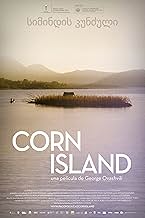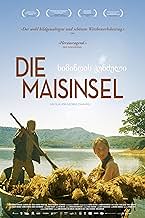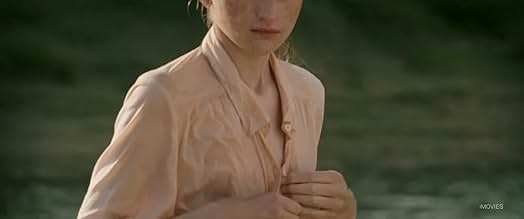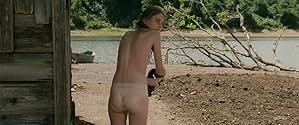AVALIAÇÃO DA IMDb
7,4/10
4,8 mil
SUA AVALIAÇÃO
O rio cria e o rio destrói em um ciclo eterno do qual nem mesmo o homem pode escapar.O rio cria e o rio destrói em um ciclo eterno do qual nem mesmo o homem pode escapar.O rio cria e o rio destrói em um ciclo eterno do qual nem mesmo o homem pode escapar.
- Direção
- Roteiristas
- Artistas
- Prêmios
- 23 vitórias e 12 indicações no total
- Direção
- Roteiristas
- Elenco e equipe completos
- Produção, bilheteria e muito mais no IMDbPro
Avaliações em destaque
Every spring the Inguri River, which forms the boundary between Georgia and Abkhazia, washes down rocks and soil creating tiny islands. Local peasants leave the riverbanks for the firm, fertile island soil to grow corn through the summer before they are eroded away by winter. Georgia's submission for Best Foreign Language Film Corn Islanddirected by George Ovashvili follows a nondescript ageing farmer and his naive granddaughter as they migrate to an island and cultivate a year's crop. During such time, border patrols from both Georgia and Abkhaz pass by, causing tensions to rise between each other while the protagonists are caught in the middle.
Corn Island provokes an idea most memorable in the finale of Jean Renoir's The Grand Illusion – this illusion being the definitions of land ownership. Through nature's creation of a temporary island and then the Old Man's claim of his own little country, the film poetically points out the irrationality of conflict over differences from being born on different pieces of land. It's thoroughly profound, but one only teased in the otherwise sparse film. Ovashvili's approach is very reminiscent of the work of Ki-duk Kim, especially Spring, Summer, Fall, Winter and Spring, with the tranquil relationship with nature, meditative pace and limited dynamics, but equal in their beauty.
The narrative is procedural, simply watching the characters build a hut, plant the seeds and farm the crop. It's lethargic, but engaging. For the most part, the characters are blank slates, but it's about what they represent. It's all about the elements, and they're always fragile and unbalanced, as the film works on the natural tension of impending and inevitable expiration. Tensions do rise when the soldiers pass by in the boats, and there is character development with the granddaughter, who's in the throes of puberty. As she catches their eye and they to her, her internal conflict about her desires for outsiders illustrates the fateful and fatal sparks between nations.
The film's elegance is owed to the precise and impressive aesthetics. Veteran Hungarian cinematographer Elemer Ragalyi's serene gliding photography captures the world on a grand but desolate scale. In essence, the film is a soundscape, with no dialogue and hardly any score until near the end. The sharp sound work creates a palpable atmosphere like last year's All is Lost. The film does suffer in its rare moments of dialogue as Ovashvili is more confident in the naturalistic poetry of man against man and man against nature but those scenes don't drag the film down. Corn Island is a slow-burning but well-executed thought- provoking film that's worth watching, especially for fans of art cinema on the lookout for fresh faces.
8/10
Read more @ The Awards Circuit (http://www.awardscircuit.com/)
Corn Island provokes an idea most memorable in the finale of Jean Renoir's The Grand Illusion – this illusion being the definitions of land ownership. Through nature's creation of a temporary island and then the Old Man's claim of his own little country, the film poetically points out the irrationality of conflict over differences from being born on different pieces of land. It's thoroughly profound, but one only teased in the otherwise sparse film. Ovashvili's approach is very reminiscent of the work of Ki-duk Kim, especially Spring, Summer, Fall, Winter and Spring, with the tranquil relationship with nature, meditative pace and limited dynamics, but equal in their beauty.
The narrative is procedural, simply watching the characters build a hut, plant the seeds and farm the crop. It's lethargic, but engaging. For the most part, the characters are blank slates, but it's about what they represent. It's all about the elements, and they're always fragile and unbalanced, as the film works on the natural tension of impending and inevitable expiration. Tensions do rise when the soldiers pass by in the boats, and there is character development with the granddaughter, who's in the throes of puberty. As she catches their eye and they to her, her internal conflict about her desires for outsiders illustrates the fateful and fatal sparks between nations.
The film's elegance is owed to the precise and impressive aesthetics. Veteran Hungarian cinematographer Elemer Ragalyi's serene gliding photography captures the world on a grand but desolate scale. In essence, the film is a soundscape, with no dialogue and hardly any score until near the end. The sharp sound work creates a palpable atmosphere like last year's All is Lost. The film does suffer in its rare moments of dialogue as Ovashvili is more confident in the naturalistic poetry of man against man and man against nature but those scenes don't drag the film down. Corn Island is a slow-burning but well-executed thought- provoking film that's worth watching, especially for fans of art cinema on the lookout for fresh faces.
8/10
Read more @ The Awards Circuit (http://www.awardscircuit.com/)
Every year, the level of the Enguri River drops to uncover islands with fertile river-bottom soil. Locals can temporarily claim these islands for a season to grow a subsistence crop. An old man with one oar in an old wooden boat slowly makes his way to just such an island. He paces it off, digs the earth, tastes the soil, decides it will do, and marks his claim with a scrap of cloth on a stick. He leaves and then returns again and again, bringing supplies including scrap lumber to build a cabin with a thatched roof and then to plant corn with the help of his granddaughter who's in her early adolescence. Almost no words are spoken.
A big part of this film is thus man versus nature. Will nature allow the old man and his granddaughter to scratch a living from this transient plot of land? This part of the film might as well be prehistoric because it's so primitive. Intentionally so.
There's another part of the film caused by the island's location: in no-man's land between the warring country of Georgia and Abkhazia, a breakaway territory. This off-screen conflict brings soldiers from both sides into the film and we have man versus man versus man.
The film takes its time in all things. It's slaved to nature's pace and the growing corn. Things unfold slowly. Some of them aren't explained. That's the way it is in real life.
If you like artistic films with beautiful cinematography, this is a film for you. If you're looking for complex ideas and twisted plots, look elsewhere. This is a primal film about conflicts in nature, conflicts between men.
A big part of this film is thus man versus nature. Will nature allow the old man and his granddaughter to scratch a living from this transient plot of land? This part of the film might as well be prehistoric because it's so primitive. Intentionally so.
There's another part of the film caused by the island's location: in no-man's land between the warring country of Georgia and Abkhazia, a breakaway territory. This off-screen conflict brings soldiers from both sides into the film and we have man versus man versus man.
The film takes its time in all things. It's slaved to nature's pace and the growing corn. Things unfold slowly. Some of them aren't explained. That's the way it is in real life.
If you like artistic films with beautiful cinematography, this is a film for you. If you're looking for complex ideas and twisted plots, look elsewhere. This is a primal film about conflicts in nature, conflicts between men.
George Ovashvili's film was showing on my cable, and I decided to check it out... it's actually a film from a decade ago that made the rounds at every major film festival and ended up with 23 wins and 12 nominations! I must say, it truly deserved every single one of them!
The story, written by Roelof Jan Minneboo, George Ovashvili, and Nugzar Shataidze, transports us to Georgia, where the Inguri River's water level drops annually, revealing islands with fertile river-bottom soil. The locals can temporarily claim these islands for a season to grow crops, so an elderly man in an old wooden boat slowly makes his way to one such island. He measures it, digs the earth, tastes the soil, decides it's suitable, and marks his claim with a piece of cloth on a stick. He leaves and returns repeatedly, bringing supplies, including scrap lumber to build a cabin with a thatched roof, and then planting corn with the help of his teenager granddaughter. Almost no words are spoken, so don't worry if you don't have subtitles (for some reason, I only had German subtitles) - you'll be just fine!
A significant aspect of this film is the profound connection between the man and nature, conveyed through captivating imagery and visuals - a timeless story that seems so primitive... intentionally so, in my opinion.
Another aspect of the film is the island's location: in the middle of the Inguri River, dividing Georgia from Abkhazia. This off-screen conflict brings soldiers from both sides, disturbing the intense bond between nature and the old man and his granddaughter.
The film takes its time with everything, and it follows the nature's pace of the flowing river, growing corn... and it feels great watching things unfolding slowly. Real life feeling! Almost perfect film!
The story, written by Roelof Jan Minneboo, George Ovashvili, and Nugzar Shataidze, transports us to Georgia, where the Inguri River's water level drops annually, revealing islands with fertile river-bottom soil. The locals can temporarily claim these islands for a season to grow crops, so an elderly man in an old wooden boat slowly makes his way to one such island. He measures it, digs the earth, tastes the soil, decides it's suitable, and marks his claim with a piece of cloth on a stick. He leaves and returns repeatedly, bringing supplies, including scrap lumber to build a cabin with a thatched roof, and then planting corn with the help of his teenager granddaughter. Almost no words are spoken, so don't worry if you don't have subtitles (for some reason, I only had German subtitles) - you'll be just fine!
A significant aspect of this film is the profound connection between the man and nature, conveyed through captivating imagery and visuals - a timeless story that seems so primitive... intentionally so, in my opinion.
Another aspect of the film is the island's location: in the middle of the Inguri River, dividing Georgia from Abkhazia. This off-screen conflict brings soldiers from both sides, disturbing the intense bond between nature and the old man and his granddaughter.
The film takes its time with everything, and it follows the nature's pace of the flowing river, growing corn... and it feels great watching things unfolding slowly. Real life feeling! Almost perfect film!
George Ovashvili's Corn Island is an auteuristic work that finds its balance between men and nature. Through the lives of an Abkhazian grandfather and his granddaughter, we find our place in the cycle of life. First you work the soil to feed yourself, then when you die you become part of the nature. This cycle reminds me of a Kim Ki-Duk film "Spring, Summer, Fall, Winter... and Spring" which is a brilliant film that attains nature from its characters' lives.
An Abkhazian peasant (Ilyas Salman) and his granddaughter (Mariam Buturishvili) are living on one of many islands created by Enguri River, the river stands as boundary between Abkhazia and Georgia. As they try to harvest enough corn to survive the winter, conflicts from outer world affects their lives. Girl finds a wounded soldier who have hidden himself in the corn plants. Old man and his granddaughter helps and hides him while his enemies searches for him. Conflict between two small groups of soldiers is an effective use of minimalism on clashes between Abkhazia and Georgia. But the film does not touch political issues, it takes the subject with an artistic point of view.
Old man has a lot of resemblances with titular character of Akira Kurosawa's "Dersu Uzala" as they both are living close to nature and away from "human". That made the watching interesting for me as I like Dersu Uzala and I think secluded characters are profound features of a film in terms of spirituality.
Generally I think director/co-screenwriter George Ovashvili take inspiration from directors Akira Kurosawa, Kim Ki-Duk and Jean Renoir (La Grande Illusion). Film has nearly no dialogue yet the cinematography of the film by Elemér Ragályi seemed like it was talking with images, I think Ragályi has a style close to Emmanuel Lubezki and Christian Berger.
It is not a masterpiece but this slow-burning film has a somber beauty, art-house fans will like it.
An Abkhazian peasant (Ilyas Salman) and his granddaughter (Mariam Buturishvili) are living on one of many islands created by Enguri River, the river stands as boundary between Abkhazia and Georgia. As they try to harvest enough corn to survive the winter, conflicts from outer world affects their lives. Girl finds a wounded soldier who have hidden himself in the corn plants. Old man and his granddaughter helps and hides him while his enemies searches for him. Conflict between two small groups of soldiers is an effective use of minimalism on clashes between Abkhazia and Georgia. But the film does not touch political issues, it takes the subject with an artistic point of view.
Old man has a lot of resemblances with titular character of Akira Kurosawa's "Dersu Uzala" as they both are living close to nature and away from "human". That made the watching interesting for me as I like Dersu Uzala and I think secluded characters are profound features of a film in terms of spirituality.
Generally I think director/co-screenwriter George Ovashvili take inspiration from directors Akira Kurosawa, Kim Ki-Duk and Jean Renoir (La Grande Illusion). Film has nearly no dialogue yet the cinematography of the film by Elemér Ragályi seemed like it was talking with images, I think Ragályi has a style close to Emmanuel Lubezki and Christian Berger.
It is not a masterpiece but this slow-burning film has a somber beauty, art-house fans will like it.
One of the main goals of art film is to depict life in its most pure, elemental state. Yet few art movies have managed to achieve that goal with as much grace and poetic depth as George Ovashivili's Corn Island. This immaculately composed film takes the viewers on a soul-touching journey into the desolate, breathtakingly beautiful wilderness of a small island in Georgia and perfectly captures the rhythm of nature and the relation between nature and the two main characters whose daily struggles are interweaved into the light, sound and motion of nature around them. Throughout the film, the viewer can't help but feel the life-like, natural quality of every picture and scene. There are no excessive details; everything is distilled into its most natural state. The image of the old man's granddaughter sitting on the boat with a bundle of shining reed under the crisp sunlight is a precise portrait of life itself. In essence, art has blended into life, and life into art. What is more remarkable is that the director has managed to convey this profound state of life without the help of dialogue. Perhaps one could argue that it is precisely the lack of dialogue that has made this film that much more powerful and moving. A scene in the beginning where the old man fondly looks at a little bird pecking at the wood conveys a sense of elegance that no language can easily convey. Even the intermittent gunshots we hear in the background and the discovery of a wounded soldier that temporarily disrupts the tranquility of the island do not lead the film to deviate from its original artistic path. On the contrary, the tension lurking in the background elevates the humanistic aspect of the film to a new height. In the end, every human gesture and activity is dissolved into the larger nature. What we are left with is a film that touches the depth of our soul with such simplicity and gracefulness that very few films can match.
Você sabia?
- CuriosidadesIn order to find the location for this movie, the filmmakers had been looking for a real island for two years. Eventually, they realised it would be too complicated and too dangerous to film on such a place. Instead, they built the island on an artificial lake, where they could control the water level to some extent, director George Ovashvili revealed in an interview.
- ConexõesReferenced in CT na MFF Karlovy Vary 2017: Generální reditel Petr Dvorák (2017)
Principais escolhas
Faça login para avaliar e ver a lista de recomendações personalizadas
- How long is Corn Island?Fornecido pela Alexa
Detalhes
- Data de lançamento
- Países de origem
- Central de atendimento oficial
- Idiomas
- Também conhecido como
- Corn Island
- Locações de filme
- Empresas de produção
- Consulte mais créditos da empresa na IMDbPro
Bilheteria
- Orçamento
- € 1.500.000 (estimativa)
- Faturamento bruto mundial
- US$ 37.445
Contribua para esta página
Sugerir uma alteração ou adicionar conteúdo ausente






















